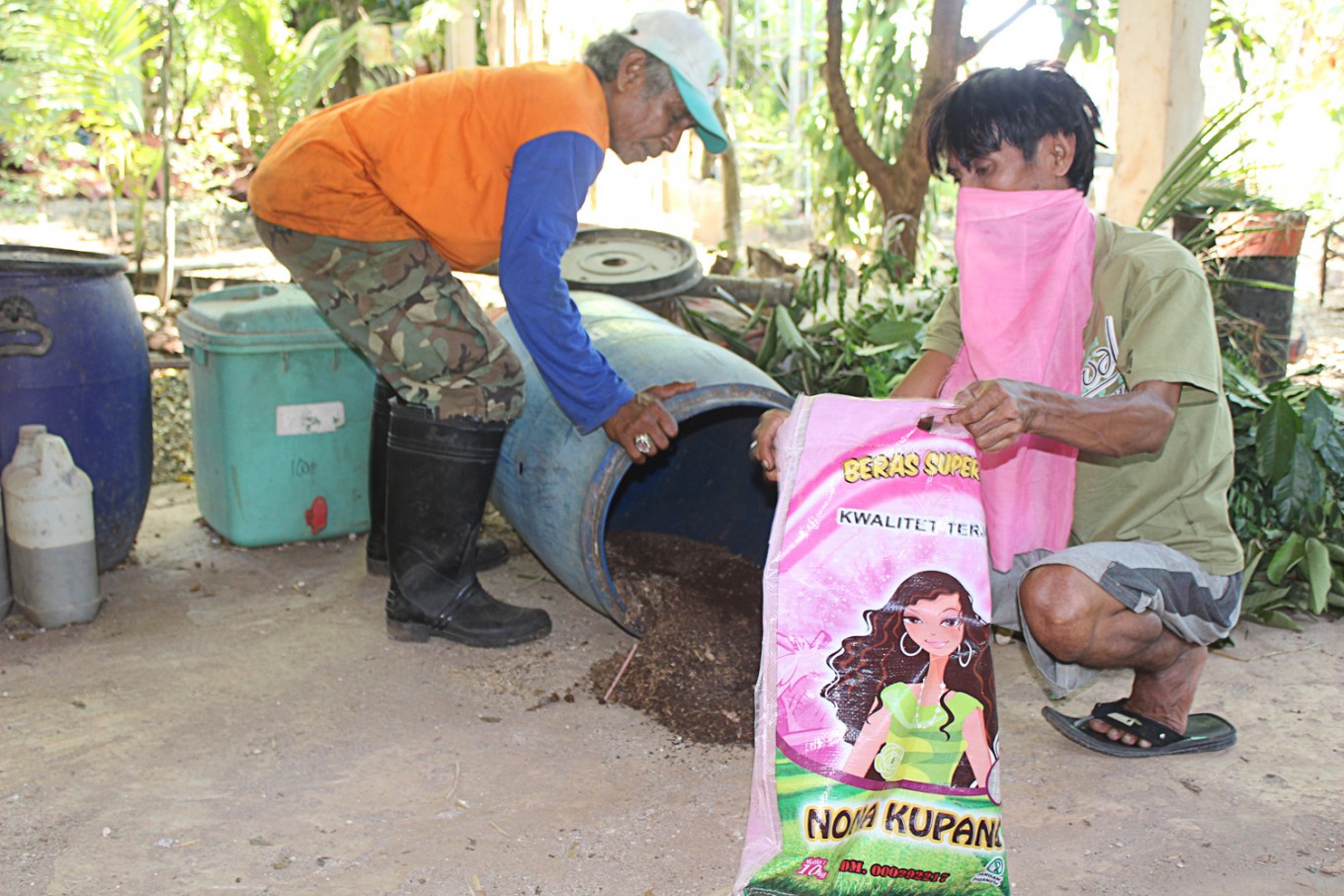Popular Reads
Top Results
Can't find what you're looking for?
View all search resultsPopular Reads
Top Results
Can't find what you're looking for?
View all search resultsOrganic waste turned into fish food, fertilizer in NTT
Change text size
Gift Premium Articles
to Anyone
M
any people consider trash to be useless. However, 64-year-old Roni Nalle, a resident of Batuplat subdistrict in Kupang, East Nusa Tenggara (NTT), uses waste to produce something with economic value.
By turning organic waste into fertilizer and fish food, Roni supports his family and has provided jobs for 10 people in his hometown.
Roni is the leader of environment conservation group Komunitas Penyelamat Lingkungan Karya Anak Negeri. He has dedicated half of his life to conserving the environment.
Since 2008, Roni and his group have processed organic waste into fish food and bokashi fertilizer, a kind of compost created via fermentation. With his dedication, Roni has earned Batuplat subdistrict a cleanliness award in a competition among subdistricts in Kupang.
“Some of the processed products from the organic waste are sold, while some residents use them for their own purposes. One sack of bokashi fertilizer is sold for Rp 10,000 [76 US cents],” Roni told thejakartapost.com in Batuplat on Saturday.
Roni, who is also the leader of community group Kelompok Swadaya Masyarakat Pengelolaan Sampah Batuplat, which focuses on waste management in the subdistrict, said the processing of organic waste into fish food and bokashi fertilizer was conducted using a community-based waste management system. He said the system was effective in handling waste problems in Kupang because it provided a link between waste sources and society.
“With community-based waste management, there is no longer the piling up of garbage at temporary garbage disposal facilities [TPST],” said Roni.
He added that the community-based waste management involved creating groups of people who worked to collect and process garbage. In his own neighborhood, Roni said, five people had joined a waste management group he created. They walked around their neighborhood to collect garbage from houses every day.
Roni said all garbage collected was sorted into three categories, namely plastic, organic waste —comprising leaves, grass and tree branches — and other trash.
“We take only organic waste to be processed into bokashi. Plastic waste usually goes to scavengers while other waste is thrown into TPST,” said Roni.
Processing organic waste took around three days, he said. Using a 24-horsepower mulching machine, the group could produce 400 kilograms of mulch, which was later mixed with cow manure and local microorganisms for fermentation.
“The fermentation only takes three days. The local microorganisms will ferment the waste without making a bad odor,” said Roni.
 Environmentally friendly – Environmental conservation group members put organic waste into a mulching machine on Saturday. They then mix the mulch with cow manure and ferment it with local microorganisms to create bokashi, a kind of fermented compost.(thejakartapost.com/Djemi Amnifu)
Environmentally friendly – Environmental conservation group members put organic waste into a mulching machine on Saturday. They then mix the mulch with cow manure and ferment it with local microorganisms to create bokashi, a kind of fermented compost.(thejakartapost.com/Djemi Amnifu)
The Batuplat resident said he never expected that the waste processing facility he began developing in 2008 could make a profit. “By processing garbage we collect from nearby residents’ homes, we earn around Rp 3 million per month. That does not include operational costs and employee incentives,” said Roni, who runs his business together with five other Batuplat residents.
In a very simple way, the organic fertilizer also can be used as fish food. The product can be spread at the bottom of an empty fish pond before being covered with fresh soil. When the pond is filled with water, the organic waste can become a food source for fish until they are ready to be harvested.
“For a 100-square-meter fish pond, we use 50 kilograms of organic fertilizer,” said Roni, adding that additional food was also needed to cultivate the fish.
Roni’s community-based management system has received attention from people and organizations across East Nusa Tenggara. Recently, the Ende Cleanliness Agency sent two groups of staff members to attend a waste management training with Roni’s organization.
Roni has also been invited to be a facilitator and give training on dry-land agriculture practices to local farmers receiving assistance from NGOs such as Care International and the Food and Agriculture Organization (FAO).
“Recently, farmers from six villages in Semaun, Kupang regency, got training here,” said Roni, adding university students also learned about community-based waste management from his project. (ebf)










